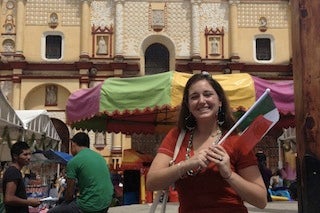International Health Students Conducting Community-Based Global Research

Posted in GUMC Stories
 Nineteen School of Nursing & Health Studies (NHS) undergraduates are conducting research this semester in seven countries as part of the Georgetown Department of International Health’s practical experience abroad program.
Nineteen School of Nursing & Health Studies (NHS) undergraduates are conducting research this semester in seven countries as part of the Georgetown Department of International Health’s practical experience abroad program.
The NHS seniors are working on a variety of health-related projects under the guidance of preceptors in Brazil, Ghana, India, Mexico, the Philippines, Rwanda and Tanzania.
“I feel like I’m experiencing everything that I’ve learned about in the last three years,” says Sarah Lloyd (NHS’14), who is focusing on women’s health care at the Navrongo Health Research Centre in Ghana.
Jewel in the Crown
Bernhard Liese, MD, DSc, MPH, the department’s chair, says connecting classroom learning with on-the-ground experience is the main point of the 12-credit global immersion experience.
“Our students come back transformed,” he says. “Students learn the foundational principles of international health in the classroom before going out into the community.”
Liese notes that the NHS students first experience community-based work through local internships during their junior year.
“The jewel in the crown of the major is this senior-level practical experience where they get a taste of conducting field research in settings around the world,” he says.
Real-world Experience
Kevin Diasti (NHS’14) and Laura Shrum (NHS’14) are spending the semester at the World Health Organization’s country office in Kigali, Rwanda.
Shrum, who is looking at a human resource training program, says the major has given her the understanding she needs in her current work – how health systems function, the roles of different stakeholders, the effects of demographic challenges and disease treatment options.
“Since the WHO functions on all planes of the health system, this background has been essential to understand what is going on in Rwanda and how the [country office] is interacting with the Ministry of Health,” she says.
Diasti also says his experience abroad has reinforced the lessons he learned at Georgetown.
“In late September, I had the amazing opportunity to visit a refugee camp and see how the policies I’ve studied in my Georgetown classes affect vulnerable populations in real time,” Diasti says. “After my visit, I knew I absolutely had to look into refugee health services more.”
Career Passion
Thomas Brooke (NHS’14), also in Navrongo, is assessing the effect of school-based lessons on students’ attitudes, knowledge and practices about HIV/AIDS and reproductive health. He says the experience is a highlight of his education at Georgetown.
“My time at Georgetown cannot be compared to any other time in my life,” he says. “The capstone of this has been to conduct my very own research project in Ghana – an experience usually privileged only to graduate students.”
Lauren Barrison (NHS’14), in Mexico researching Dengue fever, says she wanted to attend Georgetown specifically to study international health.
“The international health major has shaped my Georgetown experience both in providing me with a career passion that I hope to pursue for the rest of my life and close friends through our major’s small, tight-knit family,” she says.
By Bill Cessato, NHS Communications
